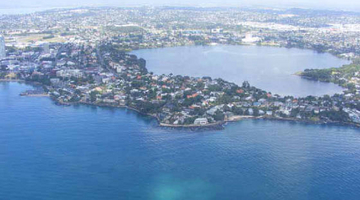Dr Jan Lindsay talks about the Auckland volcanic field – what it is, where it is and what it means for the volcanoes that lie underneath our biggest city.
Transcript
DR JAN LINDSAY
Each individual volcano in Auckland will probably not erupt again, so in that sense, they are extinct. However, the field itself is not extinct. There is a hot spot somewhere in the mantle that is periodically producing magma that rises to the surface at Auckland and produces a volcano. And every time it comes up, it pops up in a new place, because there is no magma chamber where the magma accumulates and then has a preferred vent to the surface, like at Ruapehu, for example, or Taranaki.
In Auckland, it’s coming from the mantle, and it’s coming up in a different place every time. So the field is still active even though it’s unlikely that the existing volcanoes will erupt again. The only way we really know when it might happen is by looking at past activity. And if we look at the last, say, 80,000 years in Auckland, there’s been an eruption on average about once every 3,000 years – so that’s an average eruption – but we also know that there have been times in the past where several volcanoes have erupted more or less at the same time in about 100 years.
So it’s difficult to look at averages. Don’t think we are in one of those clusters at the moment, but of course it could happen next week. That’s the nature of probabilities.
Acknowledgement:
GNS Science


